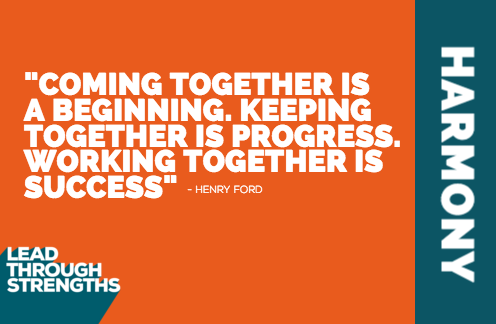People strong in the Harmony theme look for consensus. They don’t enjoy conflict; rather, they seek areas of agreement.
You can tell a person strong in HARMONY by these attributes (source: Dr. Hulme, APU):
- Peacemakers
- Seek consensus
- Can see points of view that people have in common
- Good at helping others work together
- Hold conflict to a minimum
- Practical
More about Harmony:
- Needs on a team: To Achieve Consensus
- As a Leader: To Promote Collaboration
- In Conflict: Look for Agreement
- Partner with: Command, Activator (confrontation)
- In academics:
– loves consensus – likes courses that are practical in nature, dislikes courses where there are debates and where controversy is encouraged – tends to enjoy the advising relationship and tends to see the advisor as an expert guide, so these students may stop in more frequently for advising – likes to gather people’s opinions before making a decision – good listeners who don’t often contribute their own opinion, but are good at helping people hear each other’s opinions and what they have in common – may not let you know if they disagree with you, which makes advising a little tricky

Where does Harmony Theme rank in the population?
- Overall, Harmony ranks 6th, occurring in over 19% of the population’s Top Five (21% of Females and 17% of Males)
7 |
|
10 |
9 |
Out of your Top 5 CliftonStrengths, it’s statistically:
- most likely to appear with Responsibility and Empathy
- least likely to be found with Command, Strategic and Self-Assurance
The genius of your Harmony talent stems from what you can see and how you respond to what you see. First, you can see where people can come together when they are in conflict. Often those in conflict are absolutely blind to how to resolve their conflicts because their differences seem so insurmountable. But you can often see where people in conflict could come together and resolve their differences. The second aspect of the genius of your Harmony talent is found in the way you work with people who are in conflict. Usually, one-on-one and one at a time, you will meet with those in conflict and help each person to clarify their own position and come to see the point of view of the person with whom they are in conflict. In so doing, you help conflicting people move to reconciliations. The genius of your Harmony talent is greatly needed in families, small groups, and large organization. It is as if you are the “glue” that hold relationships together. Unfortunately you sometimes do not receive the credit you deserve, as much of you best work is done behind the scenes. But know that even if no one knows but you,you make a significant and a very positive difference in all of the groups and relationships that you are in.
At your best (Balcony):
-
negotiator, can see both sides of a situation, great at asking questions, able to arrive at consensus, great facilitator
At your worst (Basement):
-
weak, indecisive, nonconfrontational, avoids conflict
HARMONY may be one of your signature themes if…
- You look are always seeking consensus and common ground.
- You feel there is nothing to gain from conflict, friction, and arguing.
- Harmony is one of your guiding values and, you feel, the key to productivity.
- You are a natural peacekeeper who focuses on topics everyone can agree upon.
- You are willing to modify your objectives to meet others halfway, so long as it is moral.
- You don’t believe in “rocking the boat” because we are “all in this together.”
- Source: Let’s Talk Personality
A more detailed explanation from Gallup:
You look for areas of agreement. In your view there is little to be gained from conflict and friction, so you seek to hold them to a minimum. When you know that the people around you hold differing views, you try to find the common ground. You try to steer them away from confrontation and toward harmony. In fact, harmony is one of your guiding values. You can’t quite believe how much time is wasted by people trying to impose their views on others. Wouldn’t we all be more productive if we kept our opinions in check and instead looked for consensus and support? You believe we would, and you live by that belief. When others are sounding off about their goals, their claims, and their fervently held opinions, you hold your peace. When others strike out in a direction, you will willingly, in the service of harmony, modify your own objectives to merge with theirs (as long as their basic values do not clash with yours). When others start to argue about their pet theory or concept, you steer clear of the debate, preferring to talk about practical, down-to-earth matters on which you can all agree. In your view we are all in the same boat, and we need this boat to get where we are going. It is a good boat. There is no need to rock it just to show that you can.
Action Items for This Theme
- In discussions, look for the practical side of things. Help others see this practical side. It is the starting point of agreement.
Use your Harmony strength to build a network of people with differing perspectives on whom you can rely when you need expertise. Your openness to these differing perspectives will help you learn. - Accept the responsibilities of being a good team member. Your willingness to adjust and your tolerance for differing views can become significant strengths.
- When two people are arguing, ask others in the group to share their thoughts. By increasing the number of voices in the conversation you are more likely to find areas where all parties can agree. You can draw people together.
- Avoid roles that will lead you to confront people on a daily basis. Sales roles based upon “cold calls,” or roles within highly competitive workplaces, for example, will frustrate or upset you.
Be ready to:
- Practice your techniques for resolving conflict without confrontation. Without these polished techniques you might find yourself simply running away from conflicts, leaving them unresolved. This could lead you to passive/aggressive behavior.
- Partner with someone with a strong Command or Activator theme. This person can help you confront the conflict head-on, when all your best efforts to resolve it have met with no success.
- The Clifton StrengthsFinder and the 34 Clifton StrengthsFinder theme names are protected by copyright of Gallup Inc., 2000. All rights reserved.
For the more visually inclined:
A fantastic website with insightful discussion of HARMONY, including
 Building your brand through this strengths
Building your brand through this strengths- Strengthening your performance at work
- Tips for managing someone with this strengths
- Partnering with someone with this strength

- Gallup on How You Can Productively Aim Your Harmony Talents
- Many universities use the StrengthsQuest Workbook to help you build relationships, more effectively study and find meaning in what you do.
- South Mountain Community College offers up ideas on Applying your Talents in Career Discovery and Applying your Talents in Academics
- Western Texas tells us about Using your Strengths In the Job Search, Interview and New Position
- Weber State University has posted action plan worksheets for each of Gallup’s 34 strengthsfinder talents.
From Lead Through Strengths listen/read:
Career Branding When Harmony Is Your Strength includes an audio file exploring:
1. Career Branding
2. Red Flag Situations At Work
3. Fresh Application Ideas
THEME INSIGHTS:
- I am (Belong) ———-> calm, even-keeled
- I will (Doing) ———-> seek to eliminate the waste of emotional energy
- I Bring (Contribution) ———-> a peace-loving, conflict- resistant approach
- I Need (Requirement) ———-> areas of agreement, common ground
- I Love (Value) ———-> the sacrifice of personal agendas to facilitate group performance
- I Hate (Value) ———-> negative effects of friction
- Metaphor/Image ———-> smoothing ruffled feathers
- Barrier Label ———-> afraid of conflict
THEME CONTRAST:
- Harmony: Let’s do what works best.
- Belief: I want to do what matters most.————————————————————————————————–
- Harmony: Being interdependent, I willingly defer to experts.
- Self-Assurance: Being independent, I confidently rely on my own expertise.

- Mastery Monday: Understanding HARMONY
- Mastery Monday: Productive Aiming: HARMONY (2018)
- Highly recommended: Utilize the Called to Coach worksheet for HARMONY as you listen.
- Theme addicts is a series created by UnleashStrengths to highlight the massive impact the StrengthsFinder assessment through interviews and discussions.
- Lead through your strengths features many interesting guests and Career Q and A about leverage your strengths at work.
- Maximize Your Strengths features interviews and discussion on developing your strengths. She really drills into each of the themes by interviewing real people on how a specific theme shows up in their lives.
- Called to Coach is a webcast resource for those who want to help others discover and use their strengths. We have Gallup experts and independent strengths coaches share tactics, insights and strategies to help coaches maximize the talent of individuals, teams and organizations around the world.
- ISOGO TV promises a lot: So dramatically increase your energy and decrease your frustration at work, that you cannot help but take the Strengths paradigm home to your family. Fueling life-changing stories.
- The True Strength Podcast by Ian Pettigrew (Kingfisher Coaching) features inspiring true stories of how people succeed through applying their strengths and being resilient. It often includes a Gallup StrengthsFinder profile.
- If you are looking to identify and develop your strengths and talents, take calculated risks and make decisions, The Strengths Revolution with Steve Morgan will help your personal development, as well as helping you support your clients, employees, teams and wider organisations. Knowing your strengths will also support positive risk-taking and decision making as part of good risk management.

 Sources:
Sources:












